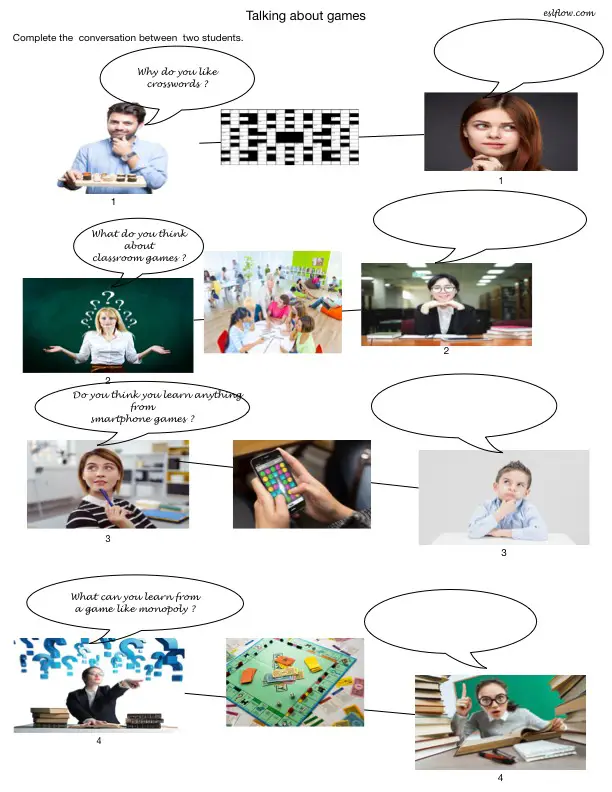Talking about games questionnaire (PDF)
Talking about games
This is an ESL speaking and discussion exercise for practicing language useful for talking about puzzles and games.
Business English Speaking Skill Worksheets
Other resources
5 Cool Advertising & Branding Vocabulary & Language Exercises
10 Jobs and Careers Vocabulary and Speaking exercises
4 Money and Finance Worksheets
10 Computing and Internet Vocabulary and Speaking Activities
5 Intercultural Body Language, Gestures and Etiquette Language Exercises
First day worksheet: understanding directions
Eternal Mingle: an icebreaker and classroom speaking activity
Eternal Mingle
The Eternal Mingle Technique
The Eternal Mingle technique has become even more valuable in today’s ESL classrooms where students often feel hesitant to speak due to increased screen time and reduced face-to-face interaction. This method directly addresses the communication challenges many students face in the 2020s by creating a structured yet dynamic environment that encourages natural conversation flow. As students continuously switch partners and topics, they build confidence in real-time communication skills that are essential for today’s collaborative workplaces and social environments where adaptability and quick thinking are highly valued.
Click here for Eternal Mingle speaking activity PDF file
STEP 1
Hand out a slip of paper to each student.
STEP 2
Delegate a word, phrase, a question beginning, a concept, a topic, or a a grammar component to each student. This depends on your lesson focus. Explain to the students that they are to write a sentence or question including the word, phrase etc.To take this step further you can also tell the students to write an answer/response to their own question/sentence on the BACK of theslip of paper
STEP 3
Model an interaction with a student. Supposing you are practicing questions, ask a student your question then listen to the response and reply if necessary. Then get the student to ask you his/her question. After the exchange switch papers and randomly choose a new partner for a new exchange. Because you are “eternally” switching papers and partners the exercise is “endless”. (I’ve often had talkative classes take the exercise and run with it for an hour or so… totally oblivious to the teacher’s presence).
EXAMPLES OF VARIATIONS
TEACHING PRESENT SIMPLE (Questions)
Delegate question beginnings such as What do…? Where does…? Why do..? Do you…? Does …….? Why don’t you..? Is there….? Are we….? Is today……? etc.
TEACHING MODALS (Questions)
Why must….? Where do you have to…? Do you need to ….? What should you….? Why mustn’t……? Should people…? etc.
TEACHING “WISH” (SENTENCES)
Tell everyone to write a wish on the front of the paper and a reason on the for their wish on the BACK. So when the students talk Student A might say ” I wish I had a car” and Student B could ask “Why don’t you have a car?” or “Why do you wish you had a car?”
DRILL FOR INDIRECT REQUESTS
Delegate the 3 most commonly used verbs for requests( to be, to do and modals) around the class. Say to the first student “verb to be”, to the second student “verb to do”, to the third student “modal”, to the fourth student “veb to be”, to the fifth student “verb to do” and so on. The students must then write a direct question using their verb type on the FRONT of the slip.
of paper and the indirect conversion of that question on the BACK of the paper. The students can then walk around reading direct questions and getting their partners to respond with the indirect question.
Related Resources:
10 Role Play Speaking Activities
11 Classroom Debate and Discussion Language Activities
5 Complaints and Annoyances Language and Speaking Activities
5 First Day of Class Activities
Hello world!
Welcome to WordPress. This is your first post. Edit or delete it, then start writing!
